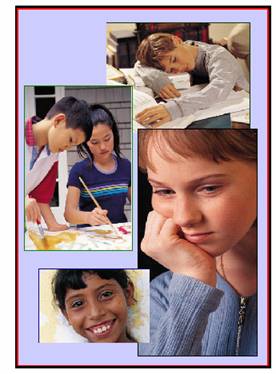 The TMCQ is a highly differentiated assessment of temperament in middle childhood. Temperament dimensions for which TMCQ scales have been created were developed and adapted from dimensions we have studied in both adults and infants via the Children’s Behavior Questionnaire (CBQ: Rothbart, 2001), Hampton Individual Differences Questionnaire (Victor & Baker, 2001), the Childhood Temperament and Personality Questionnaire (CTPQ; Victor, Rothbart & Baker, 2003), and the CBQ-BPI (Ablow & Measelle, 1993; Hwang, 2002). Four factors have been reliably recovered from this instrument, labeled Negative Affectivity, Surgency Extraversion, Effortful Control, and Sociability/Affiliation.
The TMCQ is a highly differentiated assessment of temperament in middle childhood. Temperament dimensions for which TMCQ scales have been created were developed and adapted from dimensions we have studied in both adults and infants via the Children’s Behavior Questionnaire (CBQ: Rothbart, 2001), Hampton Individual Differences Questionnaire (Victor & Baker, 2001), the Childhood Temperament and Personality Questionnaire (CTPQ; Victor, Rothbart & Baker, 2003), and the CBQ-BPI (Ablow & Measelle, 1993; Hwang, 2002). Four factors have been reliably recovered from this instrument, labeled Negative Affectivity, Surgency Extraversion, Effortful Control, and Sociability/Affiliation.
Our initial work on the TMCQ included a self-report version that could be completed by children themselves. However, subsequent studies did not support the psychometric strength of this instrument and we no longer disseminate this self-report instrument.
The Questionnaire
The Temperament in Middle Childhood Questionnaire (TMCQ) has been designed to measure temperament in children aged 7 to 10 years. The following non-English versions of the ATQ are available for download:
- A Chinese (Taiwan usage) version of the TMCQ, translated by Keng-Ling Lay, Li-Ya Sun, and Chia-Hua Chien
- A Czech version, translated by Miloň Potměšil and Petra Potměšilová of Palacky of University in Olomouc
- A Dutch version of the TMCQ, translated by Petra Warreyn and Sofia Boterberg
- A Hindi version of the TMCQ, translated by Ganga Tiwari and Tripti Verma at Centre of Behavioural and Cognitive Sciences, University of Allahabad
- An Italian version of the TMCQ, translated by Lavinia Barone
- A Japanese version of the TMCQ (pdf), translated by Yoshinobu Takahashi, Emiko Kusanagi, and Nobuko Hoshi
- A Polish version of the TMCQ, translated by Jan Cieciuch
- A Portuguese (Brazilian) version of the TMCQ, translated by Maria Beatriz Martins Linhares, Sofia Gracioli, Vivian Caroline Klein, and Graziela Nogueira de Almeida
- A Romanian version of the TMCQ, translated by Ioana Tincas and Oana Benga
- A Portuguese (European) version of the TMCQ, translated by Monica Rocha
- A Russian version of the TMCQ, translated by Anexandra Kotenkova
- A Spanish version of the TMCQ, translated by Natalia Barcons and Neus Abrines Jaume
- An Urdu version of the TMCQ, translated by Abia Nazim
The TMCQ assesses the following seventeen dimensions of temperament:
- Activity Level: Level of gross motor activity including rate and extent of locomotion.
- Affiliation: The desire for warmth and closeness with others, independent of shyness or extraversion.
- Anger/Frustration: Amount of negative affect related to interruption of ongoing tasks or goal blocking.
- Assertiveness/Dominance: Tendency to speak without hesitation and to gain and maintain control of social situations
- Attentional Focusing: Tendency to maintain attentional focus upon task-related channels.
- Discomfort: Amount of negative affect related to sensory qualities of stimulation, including intensity, rate or complexity of light, movement, sound, and texture.
- Fantasy/Openness: Active imagination, aesthetic sensitivity, intellectual curiosity.
- Fear:Amount of negative affect, including unease, worry or nervousness related to anticipated pain or distress and/or potentially threatening situations.
- High Intensity Pleasure: Amount of pleasure or enjoyment related to situations involving high stimulus intensity, rate, complexity, novelty, and incongruity.
- Impulsivity: Speed of response initiation.
- Inhibitory Control: The capacity to plan and to suppress inappropriate approach responses under instructions or in novel or uncertain situations.
- Low Intensity Pleasure: Amount of pleasure or enjoyment related to situations involving low stimulus intensity, rate, complexity, novelty, and incongruity.
- Perceptual Sensitivity:Amount of detection of slight, low intensity stimuli from the external environment.
- Sadness: Amount of negative affect and lowered mood and energy related to exposure to suffering, disappointment, and object loss.
- Shyness: Slow or inhibited approach in situations involving novelty or uncertainty.
- Soothability/Falling Reactivity: Rate of recovery from peak distress, excitement, or general arousal.
- Activation Control (Experimental Scale): The capacity to perform an action when there is a strong tendency to avoid it.
For questions regarding the TMCQ, contact Jennifer Simonds at Jen Simonds at [email protected] .
Please note that these questionnaires are to be used for research purposes only. If you are interested in acquiring current versions of these instruments, we request that you first complete our request form, providing us with a brief description of your plans for use of the measures. Following the completion of your research, we request that you contact us to inform us of the results of your project as they relate to the temperament scales.In this way, we hope to coordinate attempts at validation of the scales.
Documentation: